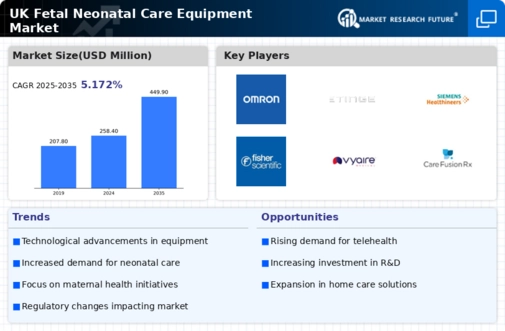Rising Birth Rates
The fetal neonatal-care-equipment market is experiencing growth due to increased birth rates across the UK. Recent statistics indicate that the birth rate has seen a modest rise, leading to a higher demand for neonatal care solutions. This trend necessitates the availability of advanced equipment to ensure the health and safety of newborns. Hospitals and healthcare facilities are investing in state-of-the-art technology to cater to the growing number of births. The increased focus on maternal and infant health has further propelled the need for specialized equipment, thereby driving the market forward. As the population continues to grow, the fetal neonatal-care-equipment market is likely to expand, reflecting the urgent need for effective neonatal care solutions.
Technological Innovations
Technological innovations are playing a pivotal role in shaping the fetal neonatal-care-equipment market. The introduction of advanced monitoring systems, incubators, and imaging technologies has revolutionized neonatal care. These innovations not only improve the quality of care but also enhance the efficiency of healthcare providers. For instance, the integration of artificial intelligence in monitoring equipment allows for real-time data analysis, which can lead to timely interventions. The market is witnessing a surge in demand for such cutting-edge technologies, as hospitals aim to provide the best possible care for newborns. This trend indicates a promising future for the fetal neonatal-care-equipment market, as ongoing research and development continue to yield new solutions.
Government Initiatives and Funding
Government initiatives and funding aimed at improving maternal and child health are significantly impacting the fetal neonatal-care-equipment market. The UK government has implemented various programs to enhance healthcare services for mothers and newborns, which includes financial support for acquiring advanced neonatal equipment. Such initiatives not only facilitate access to essential care but also encourage healthcare facilities to upgrade their equipment. The allocation of funds towards maternal and child health initiatives suggests a commitment to improving neonatal outcomes, thereby driving the demand for specialized equipment. This supportive environment is likely to foster growth in the fetal neonatal-care-equipment market, as healthcare providers respond to these initiatives.
Increased Awareness of Neonatal Care
There is a growing awareness regarding the importance of neonatal care among parents and healthcare providers in the UK. This heightened awareness is influencing the fetal neonatal-care-equipment market positively. Educational campaigns and initiatives by health organizations have emphasized the critical nature of early neonatal care, leading to increased demand for specialized equipment. As parents become more informed about the potential risks associated with premature births and other complications, they are more likely to seek advanced care solutions. Consequently, healthcare providers are compelled to enhance their offerings, resulting in a robust market for fetal neonatal-care-equipment. This trend suggests a shift towards prioritizing neonatal health, which could further stimulate market growth.
Rising Incidence of Premature Births
The rising incidence of premature births in the UK is a critical driver for the fetal neonatal-care-equipment market. Statistics indicate that the rate of premature births has been increasing, necessitating specialized care for these vulnerable infants. This trend has led to a heightened demand for advanced neonatal equipment, such as incubators and respiratory support systems, designed to cater to the needs of premature infants. Healthcare providers are increasingly investing in such equipment to ensure that they can provide adequate care for this population. The growing recognition of the challenges associated with premature births suggests that the fetal neonatal-care-equipment market will continue to expand as healthcare systems adapt to meet these needs.

















Leave a Comment